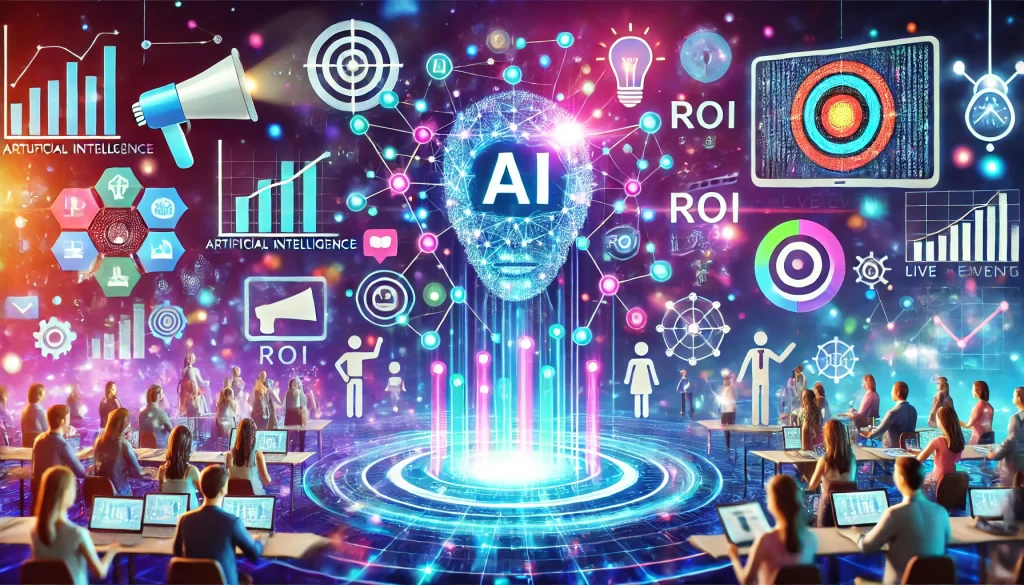In an era where technology continuously shapes consumer behaviors and expectations, integrating artificial intelligence (AI) into marketing strategies is no longer optional—it’s essential. AI has revolutionized various industries, and event marketing is no exception. By harnessing the power of AI, marketers can enhance attendee engagement, streamline processes, and maximize return on investment (ROI). This blog will explore how AI can transform event marketing, providing insights into its implementation, benefits, and best practices for leveraging this technology effectively.

Understanding AI in Event Marketing
Definition of AI and Its Relevance to Marketing
Artificial intelligence refers to the simulation of human intelligence processes by machines, particularly computer systems. These processes include learning, reasoning, problem-solving, and understanding natural language. In the context of marketing, AI technologies are used to analyze consumer data, predict trends, and automate marketing tasks, thus enhancing the overall effectiveness of marketing campaigns.
In event marketing, AI plays a crucial role in optimizing various aspects—from planning and promotion to execution and post-event analysis. By employing AI, marketers can gain deeper insights into attendee preferences, streamline communication, and create personalized experiences that drive engagement.
Different AI Technologies Used in Event Marketing
Several AI technologies are particularly relevant to event marketing:
- Machine Learning: This technology enables algorithms to learn from data patterns and make predictions without explicit programming. In event marketing, machine learning can analyze attendee data to predict behaviors, preferences, and attendance likelihood.
- Chatbots: These AI-driven tools can engage with attendees in real-time, providing information, answering questions, and facilitating registration processes. Chatbots enhance customer service and ensure a smoother attendee experience.
- Predictive Analytics: By analyzing historical data, predictive analytics can forecast future outcomes, helping marketers understand trends and make informed decisions about event planning and marketing strategies.
Benefits of Using AI in Event Marketing
The integration of AI into event marketing strategies offers numerous benefits that can significantly enhance engagement and ROI.
Personalized Attendee Experiences
AI allows marketers to tailor experiences to individual preferences. By analyzing attendee data, AI can identify interests and behaviors, enabling the creation of personalized agendas, targeted communications, and relevant content. For instance, AI-driven platforms can recommend sessions or networking opportunities based on an attendee’s profile, increasing the likelihood of participation and satisfaction.
Improved Targeting and Segmentation
With AI, marketers can refine their targeting and segmentation strategies. By leveraging data analytics, AI can segment audiences based on demographics, behaviors, and interests, allowing for more effective outreach. This precision ensures that marketing messages resonate with the right audience, ultimately driving higher engagement rates.
Enhanced Data Analysis for Better Decision-Making
AI empowers marketers with advanced data analysis capabilities. By automating data collection and analysis, marketers can quickly identify trends, measure engagement levels, and evaluate the effectiveness of marketing strategies. This real-time insight enables data-driven decision-making, helping marketers optimize their efforts for future events.
Case Studies: Successful AI Implementations
Example 1: Eventbrite
Eventbrite, a popular event management platform, has successfully integrated AI into its marketing strategy. By using machine learning algorithms, Eventbrite analyzes attendee data to provide event organizers with actionable insights. This allows organizers to create tailored marketing campaigns that target specific audience segments effectively.
Example 2: CES (Consumer Electronics Show)
CES, one of the world’s largest technology trade shows, has utilized AI to enhance attendee experiences. By employing chatbots on its event website, CES provided instant assistance to attendees, answering queries and offering personalized recommendations. This improved communication led to increased attendee satisfaction and engagement during the event.
Key Takeaways from These Case Studies
From these examples, it’s clear that successful AI implementation in event marketing hinges on understanding attendee needs and leveraging data for strategic decision-making. Personalization, real-time communication, and data-driven insights are essential components for maximizing engagement and ROI.
Best Practices for Implementing AI in Your Event Strategy
To effectively integrate AI into your event marketing strategy, consider the following best practices:
Steps to Integrate AI into Event Planning
- Define Your Goals: Identify specific objectives for your event marketing efforts. Whether it’s increasing attendance, enhancing engagement, or improving post-event analysis, clear goals will guide your AI integration.
- Collect and Analyze Data: Gather relevant data on your target audience, including demographics, preferences, and past event attendance. Use this data to inform your AI strategies.
- Choose the Right Tools: Select AI tools and platforms that align with your goals. Consider options for machine learning, chatbots, and predictive analytics based on your needs.
- Test and Optimize: Implement AI solutions on a smaller scale first, testing their effectiveness. Use feedback and data analysis to optimize your approach for larger events.
Tools and Platforms That Can Help
Several tools can facilitate the integration of AI into your event marketing strategy:
- HubSpot: This inbound marketing platform offers AI-driven analytics and automation features that can enhance event marketing efforts.
- Eventbrite: As mentioned earlier, Eventbrite provides AI tools for data analysis and personalized marketing, streamlining event planning and execution.
- Zapi: This platform allows event organizers to create AI chatbots that can assist attendees in real-time, improving communication and engagement.
Conclusion
The future of event marketing is undoubtedly intertwined with artificial intelligence. By harnessing AI technologies, marketers can create personalized experiences, improve targeting and segmentation, and leverage data for informed decision-making. As the industry continues to evolve, embracing AI will be crucial for staying competitive and maximizing ROI in event marketing.
In conclusion, if you haven’t already explored the potential of AI for your next event, now is the time. Invest in AI solutions to enhance attendee engagement and drive success in your event marketing efforts. The future is bright for those who harness the power of AI to elevate their events.